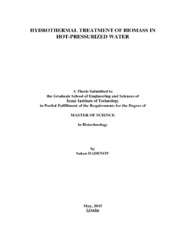Please use this identifier to cite or link to this item:
https://hdl.handle.net/11147/4337Full metadata record
| DC Field | Value | Language |
|---|---|---|
| dc.contributor.advisor | Yüksel Özşen, Aslı | en_US |
| dc.contributor.advisor | Emrullahoğlu, Mustafa | en_US |
| dc.contributor.author | Dadenov, Saken | - |
| dc.date.accessioned | 2015-11-20T12:46:37Z | |
| dc.date.available | 2015-11-20T12:46:37Z | |
| dc.date.issued | 2015-05 | |
| dc.identifier.citation | Dadenov, S. (2015). Hydrothermal treatment of biomass in hot-pressurized water. Unpublished master's thesis, İzmir Institute of Technology, İzmir, Turkey | en_US |
| dc.identifier.uri | http://hdl.handle.net/11147/4337 | |
| dc.description | Thesis (Master)--Izmir Institute of Technology, Biotechnology, Izmir, 2015 | en_US |
| dc.description | Includes bibliographical references (leaves: 69-73) | en_US |
| dc.description | Text in English; Abstract: Turkish and English | en_US |
| dc.description | xii, 73 leaves | en_US |
| dc.description.abstract | The aim of this study is to observe conversion of cellulose, which is the main compound of biomass, into its building-block chemicals in hot-pressured water as reaction medium with no addition of organic solvents. Water in liquid state under temperature and pressure above boiling point and below the critical point (374. 15 ºC and 22.1 MPa) is called as hot-pressurized water (or sub-critical water). Nowadays the biomass has great attention across the World as renewable source of energy, at the background of the quickly growing energy demand, since it is widely available and cheap. This technology is totally environmentally friendly and uses water as a reaction medium. As well known, since plant biomass contains up to 50% cellulose, it was decided to use it as a model compound in this study. Decomposition of cellulose leads to formation of various compounds. Among them levulinic acid is the most attractive chemical. Moreover, this acid marked as “Top 12 Building Blocks” of most perspective chemicals and obtaining from biomass by hydrothermal treatment is not widely studied. During this study, different reaction parameters such as temperature, pressure, reaction time and external oxidizer addition were studied to clarify their effects on cellulose decomposition and product yields to achieve the highest selectivity of the desired product. Addition of H2SO4 led to increase cellulose conversion up to 73% at 200 oC with a H2SO4 concentration of 125 mM at 60 min reaction time. Under same conditions, the yield of levulinic acid was successfully achieved to 38% after 60 min. | en_US |
| dc.description.abstract | Bu çalışmanın amacı, biyokütlenin ana bileşeni olan selülozun, herhangi bir organik çözücü eklenmeden, sıcak-basınçlı suda organik yapıtaşlarına ayrılmasını gözlemlemektir. Kaynama noktasının üstünde, kritik noktanın altında basınç ve sıcaklığa sahip sıvı haldeki suya sıcak-basınçlı su (ya da kritik altı su) denilir. Suyun kritik noktası 374.15 ºC ve 22.1 MPa’dir. Günümüzde biyokütle, kolayca erişilebilir ve ucuz olduğu için hızla büyüyen enerji talebine karşılık yenilenebilir bir enerji kaynağı olarak büyük ilgi görmektedir. Biyokütlenin enerjiye dönüştürülmesinin tasarım aşamasında birçok uygulaması vardır. Biyokütlenin hidrotermal bozunması, bu uygulamalar arasında en muhtemel olanlardan biridir. Bu uygulama tamamen çevre dostudur ve tepkime ortamı olarak suyu kullanır. İyi bilindiği üzere, bitki biyokütlesinin %50 kadarını selüloz oluşturur ve bu nedenle selüloz bu çalışmada model bileşik olarak kullanılmak üzere seçilmiştir. Selülozun ayrışması birçok değişik bileşiğin oluşmasına yol açar. Bunlar arasında en çekici olan levulinik asittir. Ayrıca, bu asit “12 En Önemli Yapıtaşı” kimiyasallarından biri olduğu için ve biyokütlenin hidrotermal bozunması üzerinde çok çalışılan bir alan olmadığı için yeşil kimya alanına bu konuda katkıda bulunmaya karar verdik. Araştırma sırasında sıcaklık, basınç, tepkime süresi, oksidan eklenmesi gibi reaksiyon parametrelerinin selüloz bozunması ve ürün verimi üzerindeki etkileri, en yüksek hedef ürünün üretilmesi amacıyla çalışılmıştır. | en_US |
| dc.language.iso | en | en_US |
| dc.publisher | Izmir Institute of Technology | en_US |
| dc.rights | info:eu-repo/semantics/openAccess | en_US |
| dc.subject | Biomass | en_US |
| dc.subject | Biomass energy | en_US |
| dc.subject | Hydrothermal alteration | en_US |
| dc.title | Hydrothermal treatment of biomass in hot-pressurized water | en_US |
| dc.title.alternative | Sıcak-basınçlı suda biyokütlenin hidrotermal bozulması | en_US |
| dc.type | Master Thesis | en_US |
| dc.institutionauthor | Dadenov, Saken | - |
| dc.department | Thesis (Master)--İzmir Institute of Technology, Bioengineering | en_US |
| dc.relation.publicationcategory | Tez | en_US |
| item.grantfulltext | open | - |
| item.openairetype | Master Thesis | - |
| item.fulltext | With Fulltext | - |
| item.cerifentitytype | Publications | - |
| item.openairecristype | http://purl.org/coar/resource_type/c_18cf | - |
| item.languageiso639-1 | en | - |
| Appears in Collections: | Master Degree / Yüksek Lisans Tezleri | |
Files in This Item:
| File | Description | Size | Format | |
|---|---|---|---|---|
| T001354.pdf | MasterThesis | 2.86 MB | Adobe PDF |  View/Open |
CORE Recommender
Page view(s)
152
checked on Jul 15, 2024
Download(s)
114
checked on Jul 15, 2024
Google ScholarTM
Check
Items in GCRIS Repository are protected by copyright, with all rights reserved, unless otherwise indicated.